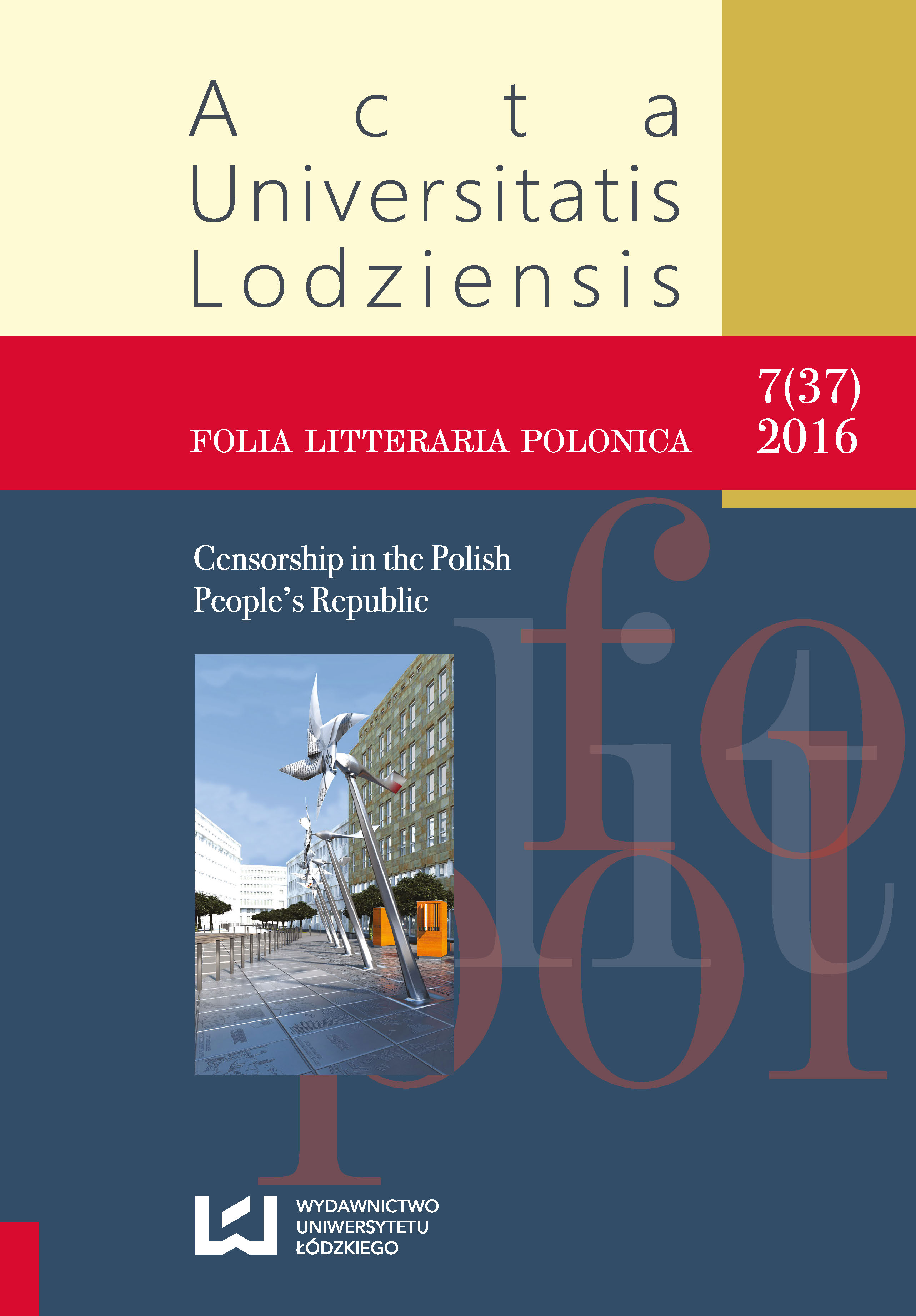Censorship Towards the Subject of the Warsaw Uprising in Belles-Lettres in 1956–1958
DOI:
https://doi.org/10.18778/1505-9057.37.11Słowa kluczowe:
Warsaw Uprising, censorship in Polish People’s RepublicAbstrakt
Right from the beginning, the subject of the Warsaw Uprising was often manipulated or even entirely erased from public discourse under the Stalinist regime. It was only after the liberalization of culture and the easing of censorship-related repressions that the said topic returned in literature. The paper focuses on the censorship bureau’s approach to the image of the Uprising presented by writers. Moreover, it attempts to specify – on the basis of specific examples – the kind of content that was accepted, rejected or amended. The juxtaposition of censors’ documents and the content of the published works allows for the examination of the depth of censors’ interventions and their methods of manipulating historical facts. Those areas of special interest include: presentation of the division among the insurgents who were supposed to belong either to the brave ordinary soldiers or the passive leadership, as well as the attitude towards the People’s Army, the First Polish Army, the Home Army or the Red Army, with special regard for its passiveness during the Uprising.
Pobrania
Bibliografia
AAN, GUKPPiW, ref. no. 426 (34/4), l. 633 [631].
Google Scholar
AAN, GUKPPiW, ref. no. 426 (34/2), l. 20.
Google Scholar
AAN, GUKPPiW, ref. no. 426 (34/2), l. 36.
Google Scholar
AAN, GUKPPiW, ref. no. 424 (31/6), l. 83.
Google Scholar
AAN, GUKPPiW, ref. no. 424 (31/36), l. 82.
Google Scholar
AAN, GUKPPiW, ref. no. 424 (31/36), l. 86.
Google Scholar
AAN, GUKPPiW, ref. no. 426 (34/3), l. 369.
Google Scholar
AAN, GUKPPiW, ref. no. 427 (34/5), l. 19.
Google Scholar
AAN, GUKPPiW, ref. no. 427 (34/5), l. 20.
Google Scholar
AAN, GUKPPiW, ref. no. 427 (34/5), l. 21.
Google Scholar
AAN, GUKPPiW, ref. no. 427 (34/5), l. 22.
Google Scholar
AAN, GUKPPiW, ref. no. 480 (38/2), l. 38.
Google Scholar
AAN, GUKPPiW, ref. no. 497 (39/3), l. 52.
Google Scholar
AAN, GUKPPiW, ref. no. 596 (68/3), l. 277.
Google Scholar
AAN, GUKPPiW, ref. no. 596 (68/3), l. 290 [287–288].
Google Scholar
AAN, GUKPPiW, ref. no. 596 (68/3), l. 295.
Google Scholar
AAN, GUKPPiW, ref. no. 597 (68/4), l. 82.
Google Scholar
AAN, GUKPPiW, ref. no. 599 (68/6), l. 3.
Google Scholar
AAN, GUKPPiW, ref. no. 599 (68/6), l. 3.
Google Scholar
AAN, GUKPPiW, ref. no. 599 (68/6), l. 3.
Google Scholar
AAN, GUKPPiW, ref. no. 600 (68/8), l. 153f, g.
Google Scholar
AAN, GUKPPiW, ref. no. 600 (68/8), l. 153a, b.
Google Scholar
AAN, GUKPPiW, ref. no. 611 (68/21), l. 2, 3.
Google Scholar
Ambroziewicz Jerzy, Namiotkiewicz Walery, Olszewski Jan, Na spotkanie ludziom z AK, “Po prostu” 1956, issue 11, p. 7.
Google Scholar
Bartelski Lesław, Pejzaż dwukrotny, Poznań 1958
Google Scholar
Bratny Roman, Kolumbowie rocznik 20., vol. 2: Śmierć po raz drugi [Die A Second Time], Wydawnictwo Poznańskie, Poznań 1957.
Google Scholar
Budrowska Kamila, Literatura i pisarze wobec cenzury PRL 1948–1958, Wydawnictwo Uniwersytetu w Białymstoku, Białystok 2009.
Google Scholar
Ficowski Jerzy, Plwocina, “Życie Literackie” 1957, issue 8 (24 Feb).
Google Scholar
Fijałkowska Barbara, Polityka i twórcy 1948−1959, PWN, Warsaw 1985.
Google Scholar
Galant Jan, Odmiany wolności. Publicystyka, krytyka i literatura polskiego Października, Wydawnictwo UAM, Poznań 2010.
Google Scholar
Gdyby Polacy wygrali w Warszawie [Had Poles won in Warsaw]… [an interview by Bartosz T. Wieliński with Dr. Jochan Böhler], Ale historia, issue 176 (“Gazeta Wyborcza” supplement), 30 Jul 2012, p. 10; http://www.archiwum.wyborcza.pl/Archiwum/1,0,7628093,20120730RP-TAH,Gdyby_Polacy_wygrali_w_Warszawie,zwykly.html [accessed on: 1.03.2014].
Google Scholar
Głowiński Michał, Rytuał i demagogia. Trzynaście szkiców o sztuce zdegradowanej, Open, Poznań 1992.
Google Scholar
Mielczarek Tomasz, Pisarze w PRL “pieszczochy władzy” czy ofiary systemu, in: Niewygodne dla władzy. Ograniczenie wolności słowa na ziemiach polskich w XIX i XX wieku, D. Degen, J. Gzella (eds.), Wydawnictwo Naukowe UMK, Toruń 2010, pp. 213–231.
Google Scholar
Polska 1956: próba nowego spojrzenia. materiały sesji naukowej zorganizowanej przez Instytut Historii PAN, Polskie Towarzystwo Historyczne i Instytut Studiów Politycznych PAN w Warszawie w dn. 21–22 października 1996 r., K. Kersten (ed.), Series: “Polska 1944/45–1989. Studia i materiały”, vol. 3, IH PAN, PTH, ISP PAN, Poznań 1997.
Google Scholar
Romek Zbigniew, Cenzura a nauka historyczna w Polsce, 1944−1970, Neriton, Warsaw 2010.
Google Scholar
Sawicki Jacek Zygmunt, Bitwa o prawdę. Historia zmagań o pamięć Powstania Warszawskiego. 1944–1989, DiG, Poznań 2005.
Google Scholar
Słownik realizmu socjalistycznego, Z. Łapiński, W. Tomasik (eds.), Universitas, Cracow 2004.
Google Scholar
Wyka Kazimierz, Składniki świetlanej struny, “Życie Literackie” 14 Oct 1956, issue 247.
Google Scholar
Współcześni polscy pisarze i badacze literatury. Słownik biobibliograficzny, J. Czachowska, A. Szałagan (eds.), Wydawnictwa Szkolne i Pedagogiczne, Warsaw 1994.
Google Scholar











